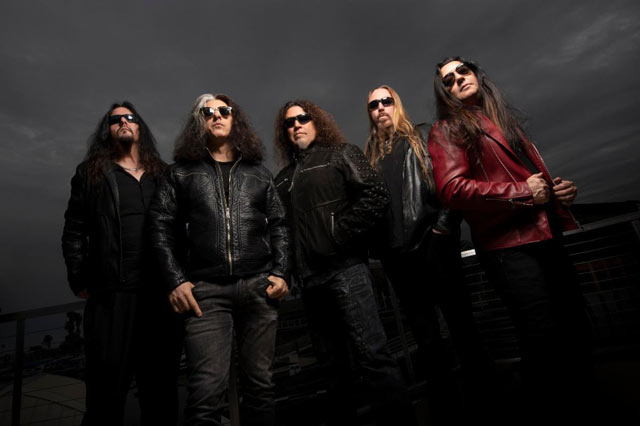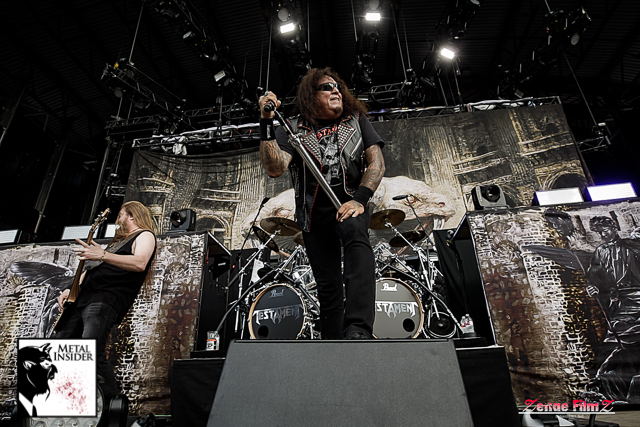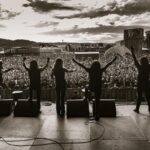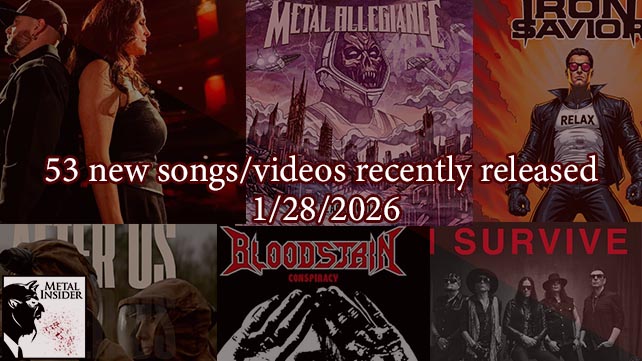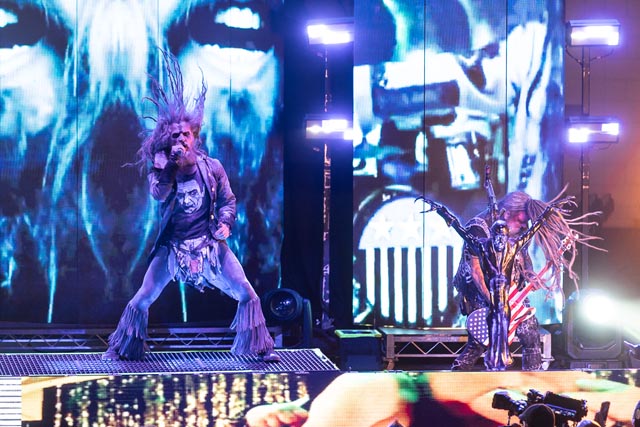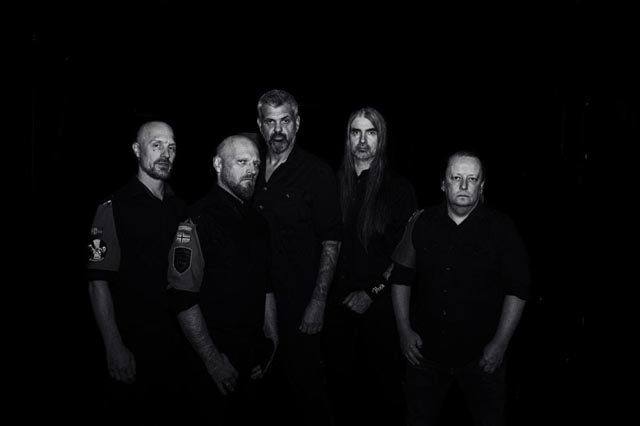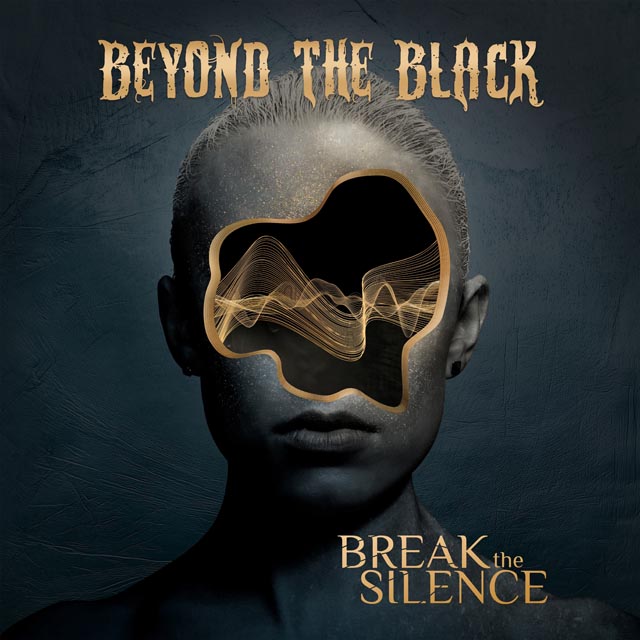
Often cited as the fifth member of the exclusive “Big 4” of thrash, San Francisco’s Death Angel is among the most consistent thrash bands working today – heralded as much for the output after their 2001 reformation just as much as their “classic” albums like 1990’s Act III. The band, with a solid membership since 2009 of guitarists Rob Cavestany and Ted Aguilar, vocalist Mark Osegueda, bassist Damien Sisson, and drummer Will Carroll, has been steadily releasing modern metal masterpieces since lacing up their boots at the Thrash of the Titans benefit for then cancer-stricken Testament vocalist Chuck Billy back in ’01 after a decade of inactivity – the latest being The Evil Divide back in May via Nuclear Blast.
A linchpin of Death Angel since the band’s return to active duty, and appearing on every one of the band’s studio albums since 2004’s The Art of Dying, is guitarist Ted Aguilar. Aguilar couldn’t have been a better choice to fill the shoes of original guitarist Gus Pepa, as Aguilar was one of the most insatiable Death Angel fans during the band’s initial ’82-91 run; he even notably showed up to the band’s “Voracious Souls” video shoot in 1987, and was an active pit participant in as many shows as possible back then. On stage in 2016, Aguilar and founding guitarist Rob Cavestany are as locked in as any metal tandem you’ll see.
Aguilar talked to Metal Insider just before Death Angel was set to play at the Rock Allegiance festival in Chester, PA. The stop was nestled into a larger tour the band is currently on along with Slayer and Anthrax, which Ted talked about. He also gave his thoughts on the recent studio album, The Evil Divide, and how the inner workings of the band operate these days. A personable guy that seemingly couldn’t be happier with his current duties mowing down crowds on a nightly basis, Aguilar filled us in on all things Death Angel.
You recently started this tour with Slayer and Anthrax, and I’m wondering, is this the best kind of tour for you – you know, where you guys have all known each other and the fan bases are pretty much interchangeable?
Yeah, man, this is a great tour – you’re playing with legends like Slayer and Anthrax. We’re finally getting to tour with them; nice venues, great crowds. The logistics of it, behind the scenes, are running pretty smooth. The best part about it is being able to play to bigger crowds with people you grew up listening to, and stuff like that. The only con is that we have a short set – 30 minutes. Some people would like us to play longer, but you know, we’re having a good time. This is probably the best tour we’ve been on since the band reformed.
Is there a difference in the way you prepare for going from that 30-minute set to headline shows on nights off like you’re doing on this tour?
The only difference is that we have to prepare mentally and physically to play like an hour longer set. But, everything else is still the same. The only difference is the hour longer, but we like that because the people that come out are usually the die-hards. We give them a little treat – play some extra songs, change up the setlist here and there, and that’s about it. All is well in our camp! (laughs)
You guys are playing this big Rock Allegiance festival not far from me in Philly, which is a very cool thing for this part of the country, as we don’t get a lot of these bigger festivals here. What is it like playing these things, do you get to hang out and watch a lot of other bands, or do you get to see and reconnect with people you haven’t seen in a while?
Well, like at Rock Allegiance, we’re on pretty early, like at noon. After that, there’s plenty of time, even in Europe, we always have time. We usually arrive several hours early to get situated and get something to eat, and we get time to check out bands and we always run into bands that we know. Especially after we go on, we get a lot of time.
So, The Evil Divide has been out a few months now, and after having some time to play songs live and digest the album, how do you think it stacks up in the Death Angel discography?
I think it stacks up well. It’s kind of cliché, but everyone says it’s the best record we’ve done, and I think it’s a great record. It’s just the next chapter in Death Angel. I look back on all the records and I like them for different reasons – each record is a moment in time that we’ve captured. I like them all pretty much equally; some better than others. The Evil Divide is who we are today; this is where our headspace is at. Is this record better than others – that’s all based on personal opinion. To me, this record is just the next step.
How was this record done as far as writing and recording this time around? Was there anything different this time out as opposed to the past records you’re done with the band?
Well, with The Art of Dying and Killing Season, we had four out of five originals in the band – everyone wrote; the four of them wrote. When we got into the Relentless Retribution era, when we got Damien and Will in the band, pretty much Rob wrote all the music to kind of show them, because he is the main songwriter. The way things are approached now, all of us – me, Will, Damien, we approach it a lot different than the old days. Rob had a vision of a song, we hear it to know where his vision is going, we play it together. After we do that, we start throwing in our little ideas of arrangement and maybe changing up a few things. Back on those two albums, everyone was writing, and everyone was kind of butting heads. In this era, it goes smooth because everyone is pretty much on the same page with Rob’s vision – we go with it and we just add our vibe to it. When everyone has a role in the band as a team player, it just makes the team that much stronger.
How did working with Jason Suecof influence the outcome of the album? What kind of vibe does he bring to the process?
He’s not one of these producers that changes up the whole song; he listens, and he pushes everyone. He’s like, “Alright man, that’s cool, let’s make it better.” When we go in there to perform, he comments on the playing – he says “I think you can do better,” and he pushes you to try something different. That’s what you really need, kind of like a second opinion, because you live with a song for so long that you kind of get stuck in your ways. Jason’s good with guitars, drums, vocals – pretty much across the board, and the way he gets the sound is unreal. A lot of the sound, the production, comes off of Rob Cavestany. If you listen to Relentless Retribution to The Evil Divide, they all sound different, sonically, but Rob and Jason work together. Jason’s albums are great – you can tell it’s Jason. When it comes to Death Angel, you can hear parts of Jason and parts of Rob, and I like that.
I was actually watching some Death Angel material on YouTube recently. I checked out the clip of Rob Cavestany and his son talking about the subject matter in the video for “Lost” off of The Evil Divide that tackles bullying. It made me wonder, when you’re on stage playing a song, do the lyrics ever go through your head and make you aware of the song’s intent when you’re playing it in that moment?
It all depends. There are times when the subject matter does cross my mind. It depends on the show – if it’s rockin’ or where my headspace is at. There are times when Mark is singing and I’m in that zone where I can kind of put myself in his mind where it’s like, “ok, I kind of know what you’re talking about.” Every now and then I drift off where I can get lost in the melody and the lyrics. Sometimes when we’re playing a song from The Ultra-Violence or Act III, it takes me back to whatever venue I went to see them where they played that song.
Speaking of videos, how do you feel about making them these days? They are not quite the promotional powerhouse they were a couple of decades ago.
Well, the use is a lot different than way back in the day. That’s a hard one. I think with YouTube being so popular, a lot of people find you through YouTube – so, yes, videos do work. I think it’s good to use them for YouTube. MTV and VH1 don’t play them anymore, so you can kind of throw them out the door, but I know in Europe, there is a lot of music television. There are a lot of outlets that play videos, so I think you still should use it, to make videos, but it’s used differently. Things like Revolver and Rolling Stone do videos, so you just have to know how to use it. You’ve got to use the internet to your advantage.
So, you’ve got to be sick of hearing the non-stop arguments on how Death Angel should be the “5” of the Big 4 thrash bands, right? (laughs)
Testament, Overkill, everyone…(laughs). You know, we’ve heard it before, and it’s very flattering, but with Death Angel, we know where Death Angel sits in the thrash world. Whether or not people want us to be considered the Big 5 – awesome, than you for the compliment. But, we know our place and we’re happy to be here. we’re not one of those bands that is like, “oh, we should be there.” No, we’re just happy to still be playing music and people are still digging our stuff. I’ll tell you the truth – it’d be nice if we could play with the Big 4. Lets’ have one big festival with the Big 4 – one stage for the Big 4, the other stage for others like us, Testament, Exodus, Overkill. That would be awesome, one insane tour.
As a guitar player myself, I love the interplay that you and Rob have both onstage and on record. Are there any particular songs from either this record or maybe the back catalog that you really love to riff on with him?
Oh man, “The Moth” would be one, “Father of Lies,” and there are songs that we haven’t played live yet but I enjoy listening to like “Breakaway.” It’s between “Hatred United,” The Moth,” “Father of Lies,” and “Lost” that we’re playing live. Those songs are really fun to play live. Rob and I look at each other like, “Whoa, that sounds killer!” Some nights the sound is so beefy, you get two guitars going at it and it’s like, “This riff sounds awesome.”
Going back to The Art of Dying, up to The Evil Divide, can you look back and see a progression through the years on the albums you’ve been a part of with Death Angel?
Yeah, I do. Every now and then I’ll go back and listen to one of those records and it just brings me back to that time where we were writing and recording it. But, you know, one time I did listen to The Art of Dying up to The Evil Divide and I was like, “Wow, we progressed as a band a lot,” especially Mark and Rob with their songwriting. You can tell it just got better and better without having to lose the foundation of what Death Angel is. I thought that was really cool to hear; not only musically, but sonically and lyrically as well. Death Angel is much more cohesive as it is today. We are able to still keep the roots of where it all came from.
You’ve got a unique story, Ted, in how you came into the band knowing what their music was all about and being very familiar with the guys. Do you remember the first song you played with the band while rehearsing for the big “comeback” show at that benefit for Chuck Billy back in 2001?
Yeah, I remember, man! We rehearsed two days before that festival. It was the first time Death Angel got together to rehearse and I had to learn everything on my own. The band hadn’t played in like 11 years, so it was pretty nerve-wracking, but it was really magical. Being able to play with a band I grew up seeing and loved, and being able to play music with them and see the crowd react…I knew what that was like because I was in that crowd when they came out in the 80’s, buying The Ultra-Violence and Act III. I was in the crowd rocking out. It was a weird, surreal trip.
Did it take you long back then to get up to speed with things like record label issues and management, coming into an established band?
You know, you just have to feel things out and know your part. These guys have been doing it for so long; even when they were broken up, they still had that experience and history. So, it was great to just sit back and see how everything went – the songwriting, the pre-production, the recording. Now, I’d say I’m really experienced in all aspects of how things work; how to maneuver within the band, how to communicate with each other, how to communicate outside the band, and all that. Like they say, “learning it on the streets.” Well, learning on the streets is being in a band. You can’t read a book to learn how to be in a band and be in the music business, you just can’t (laughs). You’ve got to get your hands dirty and get on the battlefield.
Do you guys have much of a vision yet for 2017 or is it too early to divulge anything?
Well, we finish out this Slayer tour, and there may be something before the end of the year, but if not, we’ll take the rest of the year off. We’ll probably do our Christmas shows at home in L.A. and San Francisco, and we’re confirmed to do the 70,000 Tons of Metal cruise in February. More touring for sure after that – maybe go to Europe right after the cruise, maybe do another States run, then the Summer festivals in Europe, so we’ll be busy, I predict, through the end of Summer 2017.
SEPTEMBER
27 Hard Rock Live, Orlando, FL
28 Fillmore, Miami, FL
30 Horseshoe Casino Tunica, Tunica, MS
OCTOBER
3 Norva, Norfolk, VA
5 Tabernacle, Atlanta, GA
7 Gas Monkey Live, Dallas, TX
8 ACL at the Moody Theatre, Austin, TX
10 Fillmore, Denver, CO
11 The Complex, Salt Lake City, UT
13 The Wilma Theatre, Missoula, MT
17 ENMAX Center, Lethbridge, AB
19 South Okanagan Events Centre, Penticton, BC
20 Abbotsford Centre, Abbotsford, BC
23 Reno Events Center, Reno, NV
27 El Paso County Coliseum, El Paso, TX


